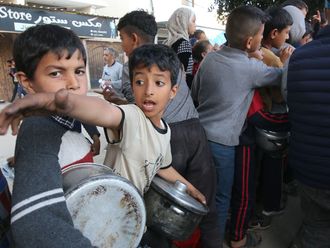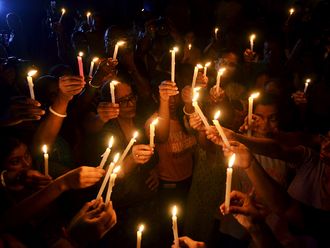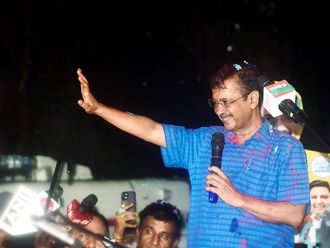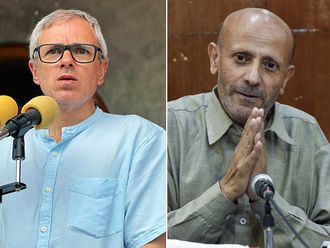If there are Palestinian textbooks on the failure of the Camp David talks with Israel in 2000, they ought to carry diagrams illustrating the use of smoke-and-mirrors tactics. In this case, the confusing burst of smoke used by the Israeli side to such spectacular effect was the "generous offer" made by then Israeli prime minster Ehud Barak — a now mythically impressive peace proposal which Palestinian president Yasser Arafat, it is claimed, both stubbornly and stupidly refused.
By this narration, the deal was intended to give back almost all of the 22 per cent of historic Palestine that Palestinians have already agreed to accept as their state. And this airbrushed account has held sway ever since; although patiently taken apart many times, it is still treated as rigid fact within Israel and among its rightist supporters.
A decade on, this spin factor has endowed a key Camp David legacy: the perception among Palestinians that talks undertaken by them in good faith are primarily designed to make them look bad. Ask Palestinians in the West Bank about the disastrous summit and the words "trap", "trick" and "public relations exercise for Israel" keep coming up. According to this view, the rejection of Barak's manifestly unacceptable offer was deployed by Israel as both proof that there is "no one to talk to" and justification for a subsequent hardline approach.
Analysts observe that the failure of those talks created a political vacuum, clearing a space for extremism on both sides. Developments after Camp David read like a chronicle of misery: the violent second Palestinian intifada followed by Israel's brutal military reoccupation of the West Bank; the continued expansion of Jewish colonies and infrastructure in the West Bank, along with the increase in stifling roadblocks and checkpoints and the construction of Israeli's choking separation barrier; the devastating split between Palestinian parties Fatah and Hamas, and Israel's deadly, three-week pounding of the Gaza strip in late 2008.
Ghassan Khatib, media director for the Palestinian National Authority, says: "Much of the deterioration witnessed in the decade that followed can be attributed to the miscalculation that led to Camp David". In common with other analysts he says that Palestinians were strong-armed into the "all or nothing" negotiations at Camp David, despite repeatedly advising US mediators that the situation was not ripe for such talks. As a consequence, there is now little faith in the international community as independent arbitrators.
Profiteering circus
Lack of trust is compounded by the fact that, since Camp David, international intervention in the Israeli-Palestinian conflict has been focused on the journey — getting talks to resume — rather than the destination. This endless talks circuit, the status of which shifts from moribund to resuscitated and limping, is viewed as a distracting sideshow, a profiteering circus. As the independent Palestinian MP Mustafa Barghouti puts it: "The peace process became a business and a substitute for peace".
A toxic, humiliating consequence of those peace process years that began with the 1993 Oslo Accords has been the creation of an aid economy in the Occupied Territories. Palestinians, who place no less emphasis on education, economy and good business than do their Israeli neighbours, are now ashamed to point out that they are among the most aid-dependent societies.
There is no good reason for this: it is absolutely a decision made by the international community, to allay some of the more devastating consequences of Israel's occupation while refusing to push for a political agreement. Now the aid carries its own disruptive caveats: for instance, USAID feeds funds into swathes of the Palestinian NGO sector, but only on condition that documents are signed to assure that the organisations to be funded are Hamas-free. Observers say that civil society organisations and grassroots groups, pre-Oslo, were far better able to take care of Palestinians than the mushrooming, internationally dependent and politically compromised NGO economy that currently powers Palestine.
And despite Israeli and international efforts to thwart Hamas, the party's position on negotiations has traction in the decade-long shadows of the collapsed Camp David summit. Mahmoud Ramahi, senior Hamas representative and the general secretary of the Palestinian legislative council, says that the Palestinian National Authority's position — financially blackmailed by the international community into appearing at endless, futile negotiating tables with Israel — is proof of how Camp David "infected policy" within the Palestinian frame.
"We accept '67 borders," he says. "But when we saw this proposal at Camp David, the people understood that Israel doesn't want to give us anything and that we have to keep resisting and fighting for our rights".
He says talks should be premised on the Israeli acceptance of basic tenets, upheld by UN resolutions and international law: "When Israel is ready to accept our rights, we are ready to negotiate on how to implement that decision".
Rachel Shabi was born in Israel to Iraqi parents, and grew up in the UK.









